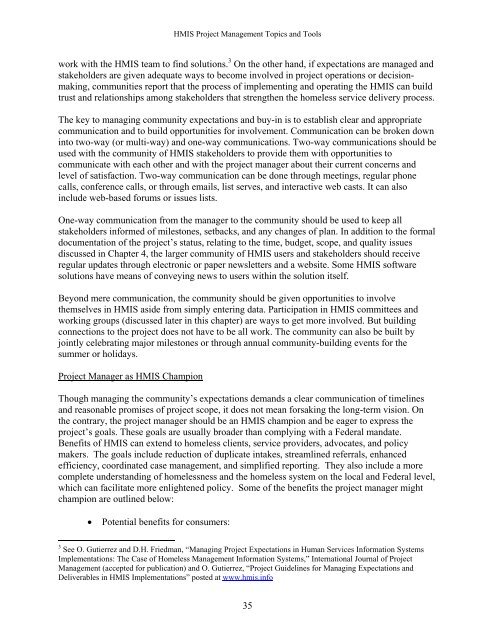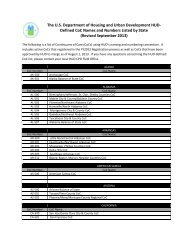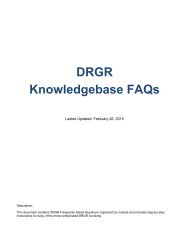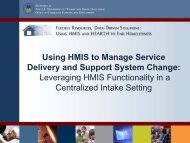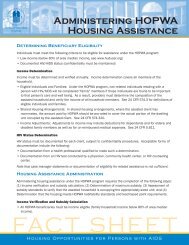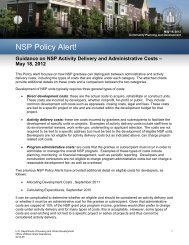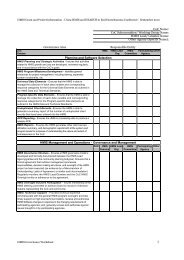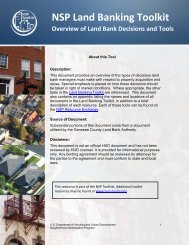HMIS Project Management Topics and Tools - OneCPD
HMIS Project Management Topics and Tools - OneCPD
HMIS Project Management Topics and Tools - OneCPD
- No tags were found...
Create successful ePaper yourself
Turn your PDF publications into a flip-book with our unique Google optimized e-Paper software.
<strong>HMIS</strong> <strong>Project</strong> <strong>Management</strong> <strong>Topics</strong> <strong>and</strong> <strong>Tools</strong>work with the <strong>HMIS</strong> team to find solutions. 3 On the other h<strong>and</strong>, if expectations are managed <strong>and</strong>stakeholders are given adequate ways to become involved in project operations or decisionmaking,communities report that the process of implementing <strong>and</strong> operating the <strong>HMIS</strong> can buildtrust <strong>and</strong> relationships among stakeholders that strengthen the homeless service delivery process.The key to managing community expectations <strong>and</strong> buy-in is to establish clear <strong>and</strong> appropriatecommunication <strong>and</strong> to build opportunities for involvement. Communication can be broken downinto two-way (or multi-way) <strong>and</strong> one-way communications. Two-way communications should beused with the community of <strong>HMIS</strong> stakeholders to provide them with opportunities tocommunicate with each other <strong>and</strong> with the project manager about their current concerns <strong>and</strong>level of satisfaction. Two-way communication can be done through meetings, regular phonecalls, conference calls, or through emails, list serves, <strong>and</strong> interactive web casts. It can alsoinclude web-based forums or issues lists.One-way communication from the manager to the community should be used to keep allstakeholders informed of milestones, setbacks, <strong>and</strong> any changes of plan. In addition to the formaldocumentation of the project’s status, relating to the time, budget, scope, <strong>and</strong> quality issuesdiscussed in Chapter 4, the larger community of <strong>HMIS</strong> users <strong>and</strong> stakeholders should receiveregular updates through electronic or paper newsletters <strong>and</strong> a website. Some <strong>HMIS</strong> softwaresolutions have means of conveying news to users within the solution itself.Beyond mere communication, the community should be given opportunities to involvethemselves in <strong>HMIS</strong> aside from simply entering data. Participation in <strong>HMIS</strong> committees <strong>and</strong>working groups (discussed later in this chapter) are ways to get more involved. But buildingconnections to the project does not have to be all work. The community can also be built byjointly celebrating major milestones or through annual community-building events for thesummer or holidays.<strong>Project</strong> Manager as <strong>HMIS</strong> ChampionThough managing the community’s expectations dem<strong>and</strong>s a clear communication of timelines<strong>and</strong> reasonable promises of project scope, it does not mean forsaking the long-term vision. Onthe contrary, the project manager should be an <strong>HMIS</strong> champion <strong>and</strong> be eager to express theproject’s goals. These goals are usually broader than complying with a Federal m<strong>and</strong>ate.Benefits of <strong>HMIS</strong> can extend to homeless clients, service providers, advocates, <strong>and</strong> policymakers. The goals include reduction of duplicate intakes, streamlined referrals, enhancedefficiency, coordinated case management, <strong>and</strong> simplified reporting. They also include a morecomplete underst<strong>and</strong>ing of homelessness <strong>and</strong> the homeless system on the local <strong>and</strong> Federal level,which can facilitate more enlightened policy. Some of the benefits the project manager mightchampion are outlined below:• Potential benefits for consumers:3 See O. Gutierrez <strong>and</strong> D.H. Friedman, “Managing <strong>Project</strong> Expectations in Human Services Information SystemsImplementations: The Case of Homeless <strong>Management</strong> Information Systems,” International Journal of <strong>Project</strong><strong>Management</strong> (accepted for publication) <strong>and</strong> O. Gutierrez, “<strong>Project</strong> Guidelines for Managing Expectations <strong>and</strong>Deliverables in <strong>HMIS</strong> Implementations” posted at www.hmis.info35


